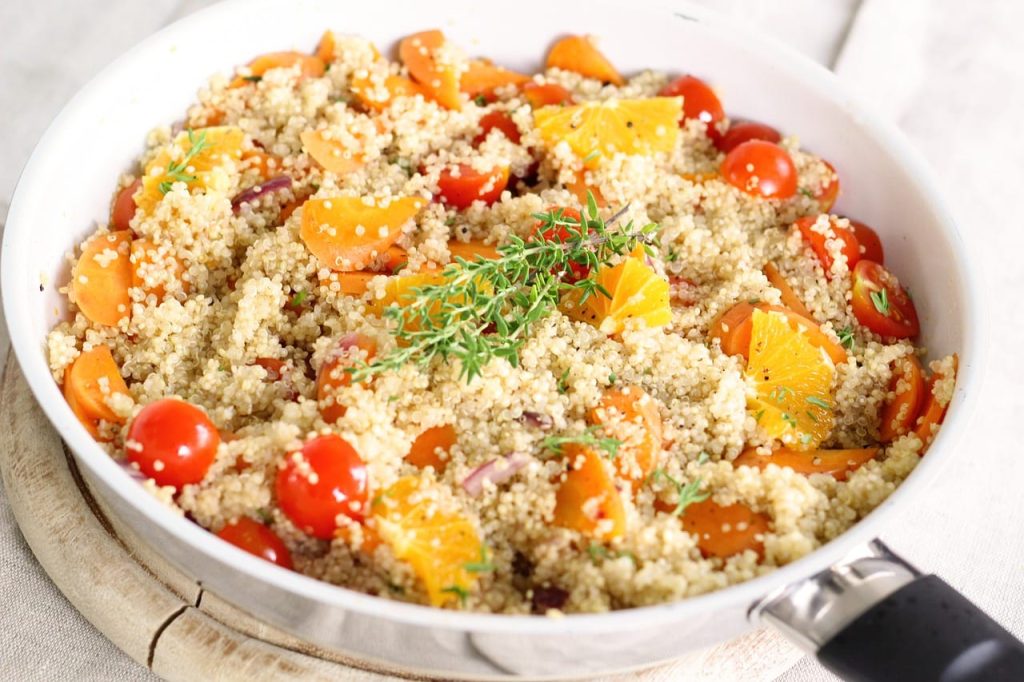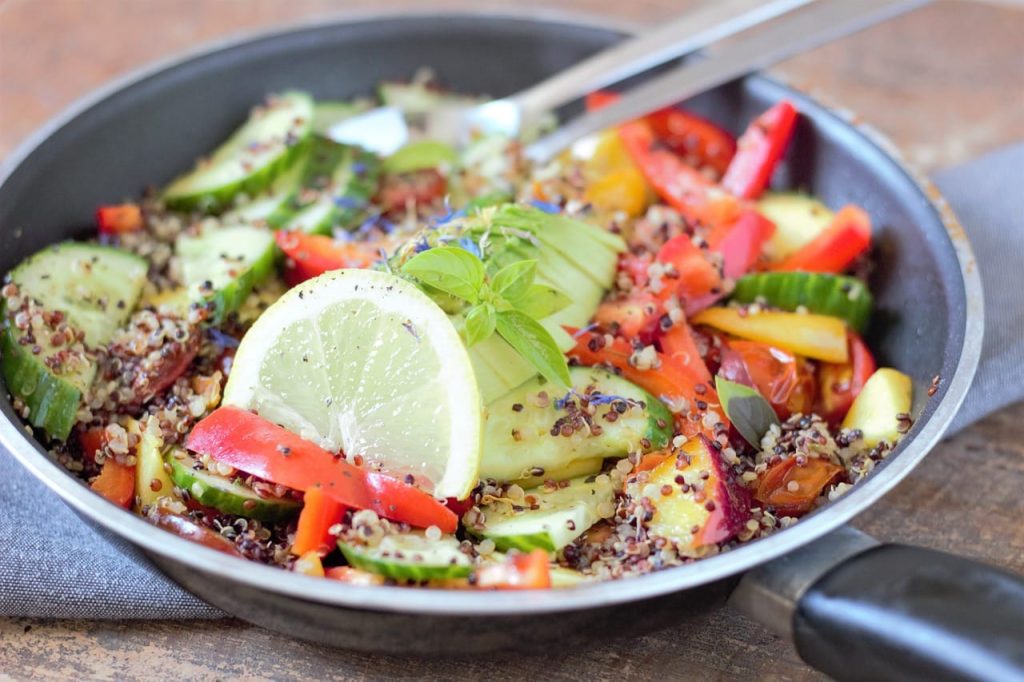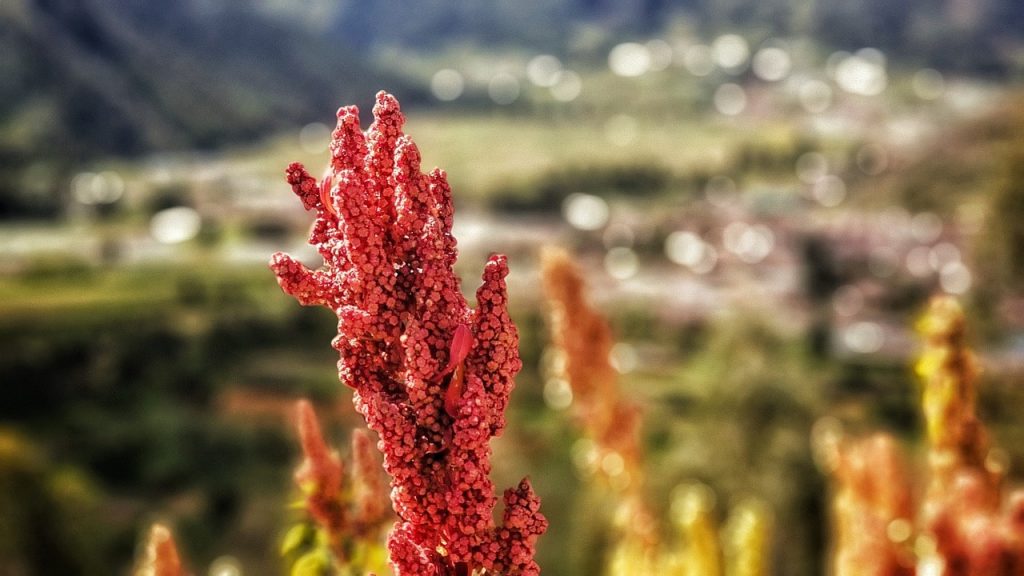Quinoa: Here at healthfulhub.com, we participate in affiliate programs and may earn a commission if you make a purchase, at no additional cost to you. Learn more
Introduction: Quinoa
Quinoa, often hailed as a superfood, has gained widespread popularity for its remarkable nutritional profile and numerous health benefits. This ancient grain, native to the Andes region of South America, has transcended cultural boundaries and become a staple in modern diets. Let’s look into the various ways quinoa contributes to overall well-being and learn a little about its history.
We mill this flour from the whole quinoa grain with nothing added or removed, so you'll find all the nutrition from whole grain quinoa in this flour. Certified organic by QAI.
Nutrient-Rich Powerhouse
Quinoa stands out as a nutrient-packed grain, boasting an impressive array of vitamins, minerals, and essential amino acids. Rich in protein, it serves as an excellent plant-based alternative for those seeking to meet their protein requirements. Additionally, quinoa is a notable source of fiber, aiding digestion and promoting a healthy gut.
Digestive Health
The high fiber content in quinoa plays a pivotal role in supporting digestive health. With approximately twice the fiber content of most grains, it promotes regular bowel movements and helps prevent constipation. The soluble fiber present in quinoa also contributes to a feeling of fullness, making it an ideal choice for those aiming to maintain a healthy weight.
Heart Health
Including quinoa in your diet can have significant benefits for cardiovascular health. Studies suggest that the fiber, potassium, and magnesium content in quinoa may help regulate blood pressure levels. Furthermore, the presence of heart-healthy fats and antioxidants contributes to reducing inflammation and lowering the risk of heart-related conditions.

Amino Acid Proficiency
Unlike many other grains, quinoa is a complete protein source, meaning it contains all nine essential amino acids that the body cannot produce on its own. This makes quinoa an invaluable addition to vegetarian and vegan diets, ensuring a well-rounded intake of essential proteins for muscle repair, immune function, and overall cellular health.
Blood Sugar Regulation
Quinoa’s low glycemic index makes it a smart choice for individuals looking to manage their blood sugar levels. The slow digestion and absorption of carbohydrates in quinoa contribute to stable blood sugar, reducing the risk of sudden spikes and crashes. This makes it an excellent option for those with diabetes or those striving to maintain consistent energy levels throughout the day.
Iron Boost for Vitality
An often-overlooked benefit of quinoa is its significant iron content. Iron is crucial for the transportation of oxygen in the blood and the overall function of red blood cells. Including quinoa in your diet can help prevent iron-deficiency anemia, which is particularly beneficial for individuals with vegetarian or vegan dietary preferences.
Antioxidant Defense
Quinoa is a rich source of antioxidants, compounds that help neutralize harmful free radicals in the body. Free radicals can cause oxidative stress, which is linked to various chronic diseases and aging. The antioxidants in quinoa, including flavonoids and polyphenols, contribute to cellular protection and may play a role in reducing the risk of certain diseases.

Bone Health
The nutritional content of quinoa extends to promoting strong and healthy bones. It is a good source of important minerals such as magnesium, phosphorus, and manganese, all of which contribute to bone density and overall bone health. Including quinoa in your diet can be especially beneficial for individuals at risk of osteoporosis or other bone-related conditions.
Weight Management
Quinoa’s combination of protein, fiber, and complex carbohydrates makes it a valuable ally in weight management. The protein content promotes satiety, reducing the likelihood of overeating, while the fiber content aids in digestion and prevents unnecessary snacking. Incorporating quinoa into a balanced diet can be an effective strategy for those looking to achieve or maintain a healthy weight.
Gluten-Free Goodness
One of quinoa’s most celebrated attributes is its gluten-free nature. For individuals with celiac disease or gluten sensitivity, quinoa serves as a versatile and nutritious alternative to traditional grains that contain gluten. It allows those with dietary restrictions to enjoy a diverse range of dishes without compromising on nutritional value or taste.
Versatile Culinary Delight
Beyond its health benefits, quinoa is a versatile ingredient that can be incorporated into a myriad of dishes. From salads and soups to stir-fries and breakfast bowls, quinoa’s mild and nutty flavor complements a wide array of ingredients. I personally love the textured crunch it can provide when slightly undercooked. Its adaptability makes it a valuable addition to any kitchen, offering both culinary creativity and nutritional benefits.

Transitioning to Quinoa in Your Diet
Now that we’ve explored the myriad health benefits of quinoa, incorporating it into your diet can be a simple yet impactful choice. Swap out traditional grains with quinoa in recipes such as rice dishes, pasta, or even as a base for salads. Experiment with quinoa flour in baking for a nutritious twist on your favorite treats.
The Ancient Origins of Quinoa
Quinoa’s journey as a staple food source dates back thousands of years, intertwining with the ancient civilizations of the Andes region in South America. The cultivation and consumption of quinoa can be traced to the Andean highlands, where it played a vital role in the diets of pre-Columbian cultures.
Early Cultivation by the Incas
The Incas, a dominant civilization in the Andes from the 13th to the 16th centuries, recognized the intrinsic value of quinoa and held it in high regard. Revered as the “mother of all grains,” quinoa was a sacred crop, integral to religious ceremonies and daily sustenance. The Incas were meticulous cultivators, developing advanced agricultural techniques that allowed quinoa to thrive in the harsh mountainous terrain.

Cultural Significance
Beyond its nutritional richness, quinoa held cultural significance for these ancient peoples. Its cultivation was deeply ingrained in their traditions, with ceremonies and rituals dedicated to the planting and harvesting of this precious grain. The Incas also believed quinoa to be a gift from the gods, attributing it with mystical properties and associating it with fertility and prosperity.
Decline and Rediscovery
The arrival of Spanish conquistadors in the 16th century marked a challenging period for quinoa. As part of a broader effort to suppress indigenous cultures, the Spanish colonizers sought to undermine traditional Andean crops, favoring European grains like wheat and barley. Consequently, quinoa cultivation declined, and its cultural importance waned.
Despite external pressures, local communities sustained the resilience of quinoa by continuing to cultivate and consume it through the centuries. In the late 20th century, a renewed interest in healthy and diverse diets sparked a global rediscovery of quinoa, leading to its widespread cultivation and popularity beyond its South American origins.
Quinoa: Modern Resurgence
In the late 20th century, quinoa underwent a remarkable resurgence, transcending its historical roots to become a global phenomenon. Recognized for its exceptional nutritional content and adaptability, quinoa has captured the attention of health-conscious consumers worldwide. The United Nations even declared 2013 the “International Year of Quinoa,” acknowledging its contribution to food security and nutrition.
Cultural Heritage and Global Impact
Quinoa’s journey from a sacred grain in ancient Andean civilizations to a global superfood reflects its enduring cultural heritage and nutritional prowess. Its cultivation and consumption have evolved, yet the reverence for this resilient grain remains embedded in the Andean cultural fabric. Today, quinoa stands not only as a testament to the wisdom of ancient civilizations but also as a symbol of sustainable, nutritious agriculture with the power to nourish communities across the globe.
- Twelve 8.5 OZ pouches of SEEDS OF CHANGE Certified Organic Quinoa & Brown Rice with Garlic
- Easy-to-prepare rice works as an integral part of your favorite side dishes and rice bowls for any occasion
Conclusion: Quinoa
Quinoa’s exceptional nutritional profile and versatile culinary applications make it a standout choice for those seeking to enhance their overall well-being. From supporting digestive health and cardiovascular function to providing essential nutrients for vegetarians and vegans, quinoa’s health benefits are both diverse and scientifically supported. As you embark on your journey to better health, consider making quinoa a staple in your diet and savoring the benefits this ancient grain has to offer. We all know that sometimes when we make changes to our diet like this, it can end up being temporary.
Quinoa is one ingredient of such versatility and importance that I encourage you to do your best to make it a mainstay throughout your life. If you enjoyed this article, please consider sharing it with someone you know who may not be aware of quinoa and its amazing benefits.
For further reading, take a look at my last article: The Health Benefits of Goji Berries Revealed

Michael is a freelance writer. He devotes a great deal of time to reviewing health-related products and is passionate about writing engaging and helpful content. With over twenty years of experience, he writes to help you make well-informed decisions for the health of you and your family.

